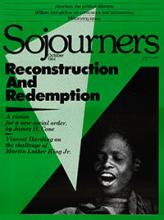The following article is excerpted from a speech that Vincent Harding gave on October 21, 1983, at a conference titled "The Black Church, the Third World, and Peace," in Atlanta, Georgia. —The Editors
I could not come to Atlanta for a conference such as this without knowing that I would have to deal with Martin Luther King Jr. and what he means to all of us. Let me begin by sharing a recollection of something that happened in 1968, just a few months after our friend Martin King was assassinated. My wife, Rosemarie Harding, was visiting in the home of two poor, older black women here in Atlanta. In their two-room apartment, up on the wall in the place of honor next to the picture of Jesus, was a picture of Martin Luther King Jr. One of the women told Rosemarie that King had come "to her a number of times since his death." That seemed right, and totally at one with the meaning of Martin Luther King Jr. in our lives.
As I have reflected on that, what is also clear, especially in the light of the establishment of the King holiday, is that there is a tremendous danger of our doing with Martin King precisely what we have so often done to Jesus. That is, put him up on the wall and leave him there, to use his birthday as a holiday and an excuse for going wild over buying things, or domesticate him—taking him according to what we want, rather than what he is demanding of us. The temptation is to smooth him off at the edges and forget what the assistant director of the FBI said about him in 1963: "We must mark King now, if we have not done so before, as the most dangerous Negro of the future in this nation." A dangerous Negro, now a national hero. How shall we work with that?
Read the Full Article

